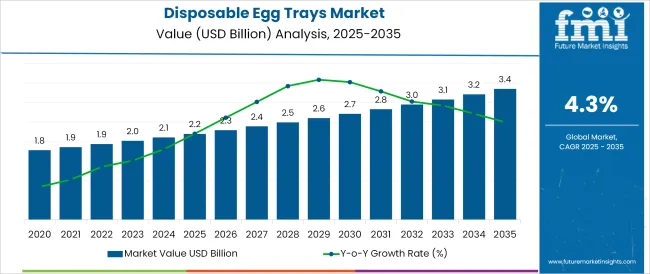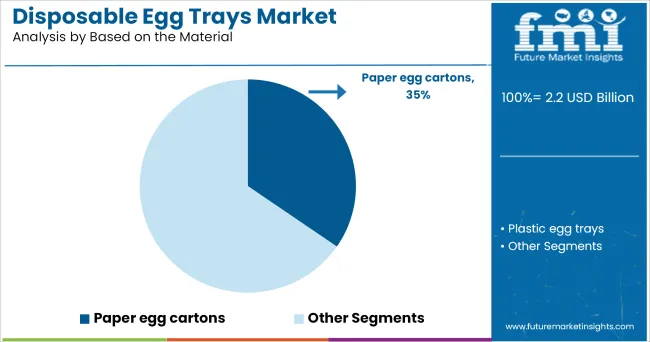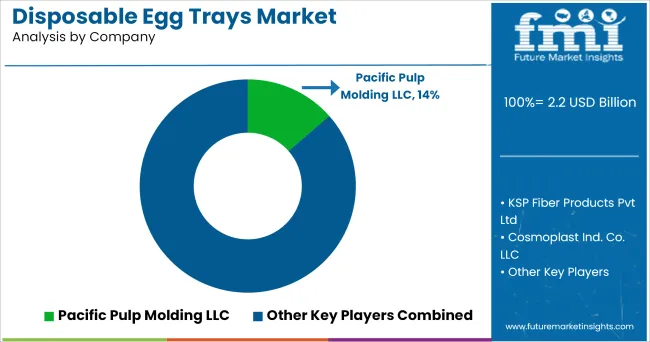The Disposable Egg Trays Market is estimated to be valued at USD 2.2 billion in 2025 and is projected to reach USD 3.4 billion by 2035, registering a compound annual growth rate (CAGR) of 4.3% over the forecast period.

The disposable egg trays market is witnessing steady expansion, driven by the growing demand for sustainable and protective packaging in the poultry sector. Rising global egg consumption, coupled with heightened concerns about biosecurity and breakage prevention, has accelerated the need for durable and hygienic transit solutions.
A shift toward eco-conscious materials has been observed, as governments and retailers enforce stricter guidelines on single-use plastics. Manufacturers are responding with recyclable, compostable, and biodegradable options that maintain product integrity while aligning with circular economy goals. Developments in molded pulp technology and lightweight design have further enhanced the functionality and cost-efficiency of disposable trays.
Increasing urbanization and retail penetration, especially in emerging markets, are contributing to volume growth. The market outlook remains optimistic, supported by a combination of food safety regulations, increased retail shelf life requirements, and the growing influence of environmentally responsible supply chain practices.

It is projected that paper egg cartons will represent 34.60% of the total market revenue by 2025 within the material category, making it the dominant sub-segment. This leadership is attributed to the segment’s environmental compatibility, recyclability, and cost-efficiency. Paper-based trays offer superior breathability, minimizing condensation and spoilage risk during transport.
The molded pulp structure provides effective cushioning, reducing breakage rates without adding significant weight. Regulatory encouragement of biodegradable packaging alternatives, along with increased consumer preference for plastic-free options, has further reinforced the adoption of paper egg cartons.
Manufacturers have also scaled production with automated machinery and local sourcing, improving turnaround time and reducing carbon footprint. These combined advantages have made paper cartons the preferred material type across both commercial farms and retail packaging lines.
The online segment is expected to contribute 28.60% of total revenue within the sales channel category by 2025, establishing its position as a leading distribution mode. The rise of e-commerce platforms specializing in agricultural, foodservice, and packaging supplies has supported this growth.
Online availability of disposable egg trays has offered end-users-such as small-scale poultry farms, bakeries, and urban retailers-greater purchasing flexibility and access to a wider variety of options. Additionally, digital procurement has reduced dependency on traditional wholesale networks, enhancing cost transparency and delivery timelines.
As rural digitization increases and procurement becomes more decentralized, online platforms have gained traction as efficient, scalable, and accessible sales channels. This shift is also driven by convenience, volume-based discounts, and the growing adoption of subscription-based supply models by smaller enterprises seeking reliable restocking solutions.
Disposable egg trays are usually made up of paper pulp which is used to store eggs from poultry farms and are disposed of after use. Being made up of paper pulp, they are environmental-friendly which sustainable.
Beyond being sustainable, they also have enhanced durability with the smooth finish, owing to the thick multi-layers of paper pulp which is used as the packaging material for safeguarding & protecting eggs.
Disposable egg trays are not only useful in storing eggs but also preferred by the manufacturers during the transportation of the eggs, due to its significant physical and barrier properties.
The disposable egg trays are lightweight and easy to handle due to the cavities that are created by the disposable egg tray forming machine. They have excellent external shock resistance for the protection of the eggs during transportation.
Nowadays, the majority of disposable egg tray manufacturing companies are using a large amount of recycled paper as compared to cardboard and other materials which were used traditionally.
Using recycled paper in egg trays not only adds benefit to the environment but also for the consumers, as it is less expensive than virgin paper egg trays. The reusability of recycled paper enhances its extensive use in the manufacturing of disposable egg trays instead of wasting and polluting the environment.
Disposable egg trays are mostly made up of moulded fiber, cardboard, and other paper-related materials. Moulded fiber provides a strong integrated framework to the egg trays along with the suitable stiffness and rigidity, which makes the disposable egg tray shock-resistant during the transportation of the eggs and thereby is preferred by many of the farmers and poultry businesses.
Compared to the plastic trays, the moulded fiber provides good air permeability and hygroscopic ability, which plays a vital role during the storage of eggs.
The disposable egg trays made up of moulded fiber have a high price compared to plastic trays because they are more eco-friendly. Also, the moulded fiber disposable egg trays are susceptible to the growth of fungus in the humid environment which can result in the damage of eggs and could also lead to the making of a foul odour.

The following global key players such as
Key Asian players manufacturing disposable egg trays are
The manufacturers involved in the manufacturing of disposable egg trays are involved in the expansion of the production plants and the new product launch in the manufacturing of Disposable Egg Trays.
The majority of the disposable egg tray manufacturers are present in India which contributes maximum share to the market. Also, India has a huge population which is involved in agriculture and poultry businesses for making money which is expected to uplift the disposable egg trays market in the coming days.
The global disposable egg trays market is estimated to be valued at USD 2.2 billion in 2025.
The market size for the disposable egg trays market is projected to reach USD 3.4 billion by 2035.
The disposable egg trays market is expected to grow at a 4.3% CAGR between 2025 and 2035.
The key product types in disposable egg trays market are 2 to 6, 8 to 12, 12 to 24 and more than 24.
In terms of based on the material, paper egg cartons segment to command 34.6% share in the disposable egg trays market in 2025.






Full Research Suite comprises of:
Market outlook & trends analysis
Interviews & case studies
Strategic recommendations
Vendor profiles & capabilities analysis
5-year forecasts
8 regions and 60+ country-level data splits
Market segment data splits
12 months of continuous data updates
DELIVERED AS:
PDF EXCEL ONLINE
Competitive Landscape of Disposable Egg Tray Providers
Disposable Drills Market Size and Share Forecast Outlook 2025 to 2035
Disposable Food Containers Market Size and Share Forecast Outlook 2025 to 2035
Disposable Protective Apparel Market Size and Share Forecast Outlook 2025 to 2035
Disposable Plates Market Size and Share Forecast Outlook 2025 to 2035
Disposable Hygiene Adhesives Market Size and Share Forecast Outlook 2025 to 2035
Disposable Umbilical Cord Protection Bag Market Size and Share Forecast Outlook 2025 to 2035
Disposable E-Cigarettes Market Size and Share Forecast Outlook 2025 to 2035
Disposable Pen Injectors Market Size and Share Forecast Outlook 2025 to 2035
Disposable Trocars Market Analysis - Size, Share, and Forecast Outlook 2025 to 2035
Disposable Cups Market Size and Share Forecast Outlook 2025 to 2035
Disposable Electric Toothbrushes Market Size and Share Forecast Outlook 2025 to 2035
Disposable Barrier Sleeves Market Size and Share Forecast Outlook 2025 to 2035
Disposable Plastic Pallet Market Size and Share Forecast Outlook 2025 to 2035
Disposable Curd Cups Market Size and Share Forecast Outlook 2025 to 2035
Disposable Blood Pressure Cuffs Market Analysis - Size, Share & Forecast 2025 to 2035
Disposable Cutlery Market Size, Growth, and Forecast 2025 to 2035
Disposable Spinal Instruments Market Analysis - Size, Share, and Forecast 2025 to 2035
Disposable Lids Market Analysis - Growth & Forecast 2025 to 2035
Disposable Face Mask Market Insights – Growth & Demand 2025 to 2035

Thank you!
You will receive an email from our Business Development Manager. Please be sure to check your SPAM/JUNK folder too.
Chat With
MaRIA